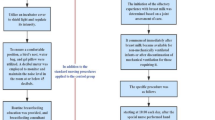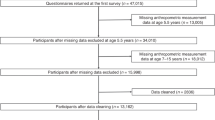Abstract
Several studies have suggested that breastfeeding is related to infant autonomic functioning. The authors investigated whether this is a causal relation. In all, 444 mothers reported breastfeeding practices 2 mo postpartum. Infant autonomic functioning was assessed by heart rate variability at age 14 mo, after discontinuation of breastfeeding. The dose-dependent association between breastfeeding and infant autonomic functioning was tested with linear regression models adjusted for multiple confounders. The authors investigated the relation of fruitpurée consumption with infant autonomic functioning. Fruitpurée consumption has similar socioeconomic epiphenomena but is not related via the same causal mechanism to autonomic regulation as breastfeeding. Nonbreastfed infants had high sympathetic modulation [7.87 log (ms2)/SD, 95% CI: 7.71–8.02], partially breastfed infants had intermediate sympathetic modulation [7.75 log (ms2)/SD, 95% CI: 7.51–7.82], sympathetic modulation of exclusively breastfed infants was low [7.63 log (ms2)/SD, 95% CI: 7.50–7.77]. However, this association could be explained by socioeconomic confounders. Furthermore, fruitpurée consumption was similarly associated with reduced infant sympathetic modulation. The association between breastfeeding practices and infant sympathetic modulation was accounted for by socioeconomic and environmental factors. We found a similar association between fruitpurée consumption and autonomic functioning, further suggesting that the association between breastfeeding and infant autonomic functioning is noncausal.
Similar content being viewed by others
Log in or create a free account to read this content
Gain free access to this article, as well as selected content from this journal and more on nature.com
or
Abbreviations
- HF:
-
high frequency
- LF:
-
low frequency
References
Buyken AE, Karaolis-Danckert N, Remer T, Bolzenius K, Landsberg B, Kroke A 2008 Effects of breastfeeding on trajectories of body fat and BMI throughout childhood. Obesity (Silver Spring) 16: 389–395
Lawlor DA, Smith GD 2005 Early life determinants of adult blood pressure. Curr Opin Nephrol Hypertens 14: 259–264
Marmot MG, Page CM, Atkins E, Douglas JW 1980 Effect of breast-feeding on plasma cholesterol and weight in young adults. J Epidemiol Community Health 34: 164–167
Martin RM, Ebrahim S, Griffin M, Davey Smith G, Nicolaides AN, Georgiou N, Watson S, Frankel S, Holly JM, Gunnell D 2005 Breastfeeding and atherosclerosis: intima-media thickness and plaques at 65-year follow-up of the Boyd Orr cohort. Arterioscler Thromb Vasc Biol 25: 1482–1488
di Pietro JA, Larson SK, Porges SW 1987 Behavioral and heart rate pattern differences between breast-fed and bottle-fed neonates. Dev Psychol 23: 467–474
Butte NF, Smith EO, Garza C 1991 Heart rates of breast-fed and formula-fed infants. J Pediatr Gastroenterol Nutr 13: 391–396
Kannel WB, Kannel C, Paffenbarger RS Jr, Cupples LA 1987 Heart rate and cardiovascular mortality: the Framingham Study. Am Heart J 113: 1489–1494
Tsuji H, Larson MG, Venditti FJ Jr, Manders ES, Evans JC, Feldman CL, Levy D 1996 Impact of reduced heart rate variability on risk for cardiac events. The Framingham Heart Study. Circulation 94: 2850–2855
Mozaffarian D, Stein PK, Prineas RJ, Siscovick DS 2008 Dietary fish and omega-3 fatty acid consumption and heart rate variability in US adults. Circulation 117: 1130–1137
World Health Organization 2003 Global Strategy for Infant and Young Child Feeding. World Health Organization, Geneva. Available at: http://www.who.int/nutrition/publications/gs_infant_feeding_text_eng.pdf. Accessed June 1, 2011.
Chirouze V, Lapillonne A, Putet G, Salle BL 1994 Red blood cell fatty acid composition in low-birth-weight infants fed either human milk or formula during the first months of life. Acta Paediatr Suppl 405: 70–77
Koletzko B, Lien E, Agostoni C, Bohles H, Campoy C, Cetin I, Decsi T, Dudenhausen JW, Dupont C, Forsyth S, Hoesli I, Holzgreve W, Lapillonne A, Putet G, Secher NJ, Symonds M, Szajewska H, Willatts P, Uauy R 2008 The roles of long-chain polyunsaturated fatty acids in pregnancy, lactation and infancy: review of current knowledge and consensus recommendations. J Perinat Med 36: 5–14
Chen CH, Wang TM, Chang HM, Chi CS 2000 The effect of breast- and bottle-feeding on oxygen saturation and body temperature in preterm infants. J Hum Lact 16: 21–27
Meier P, Anderson GC 1987 Responses of small preterm infants to bottle- and breast-feeding. MCN Am J Matern Child Nurs 12: 97–105
Feldman R, Eidelman AI 2003 Skin-to-skin contact (Kangaroo Care) accelerates autonomic and neurobehavioural maturation in preterm infants. Dev Med Child Neurol 45: 274–281
Simmons D 1997 NIDDM and breastfeeding. Lancet 350: 157–158
Der G, Batty GD, Deary IJ 2006 Effect of breast feeding on intelligence in children: prospective study, sibling pairs analysis, and meta-analysis. BMJ 333: 945
Ip S, Chung M, Raman G, Trikalinos TA, Lau J 2009 A summary of the Agency for Healthcare Research and Quality's evidence report on breastfeeding in developed countries. Breastfeed Med 4: S17–S30
Britton JR, Britton HL, Gronwaldt V 2006 Breastfeeding, sensitivity, and attachment. Pediatrics 118: e1436–e1443
Kaplan LA, Evans L, Monk C 2008 Effects of mothers' prenatal psychiatric status and postnatal caregiving on infant biobehavioral regulation: can prenatal programming be modified?. Early Hum Dev 84: 249–256
Hernán MA, Hernández-Díaz S, Werler MM, Mitchell AA 2002 Causal knowledge as a prerequisite for confounding evaluation: an application to birth defects epidemiology. Am J Epidemiol 155: 176–184
Pearl J 2000 Causality: Models, Reasoning, and Inference. Cambridge University Press, Cambridge,
Yngve A, Sjostrom M 2001 Breastfeeding in countries of the European Union and EFTA: current and proposed recommendations, rationale, prevalence, duration and trends. Public Health Nutr 4: 631–645
van Rossem L, Oenema A, Steegers EA, Moll HA, Jaddoe VW, Hofman A, Mackenbach JP, Raat H 2009 Are starting and continuing breastfeeding related to educational background? The generation R study. Pediatrics 123: e1017–e1027
Martin RM, Goodall SH, Gunnell D, Davey Smith G 2007 Breast feeding in infancy and social mobility: 60-year follow-up of the Boyd Orr cohort. Arch Dis Child 92: 317–321
Smith GD 2008 Assessing intrauterine influences on offspring health outcomes: can epidemiological studies yield robust findings?. Basic Clin Pharmacol Toxicol 102: 245–256
Jaddoe VW, Mackenbach JP, Moll HA, Steegers EA, Tiemeier H, Verhulst FC, Witteman JC, Hofman A 2006 The Generation R Study: design and cohort profile. Eur J Epidemiol 21: 475–484
Jaddoe VW, Bakker R, van Duijn CM, van der Heijden AJ, Lindemans J, Mackenbach JP, Moll HA, Steegers EA, Tiemeier H, Uitterlinden AG, Verhulst FC, Hofman A 2007 The Generation R Study Biobank: a resource for epidemiological studies in children and their parents. Eur J Epidemiol 22: 917–923
van Steenis HG, Tulen JH, Mulder LJ 1994 Heart rate variability spectra based on non-equidistant sampling: the spectrum of counts and the instantaneous heart rate spectrum. Med Eng Phys 16: 355–362
Bar-Haim Y, Marshall PJ, Fox NA 2000 Developmental changes in heart period and high-frequency heart period variability from 4 months to 4 years of age. Dev Psychobiol 37: 44–56
Faul F, Erdfelder E, Lang AG, Buchner A 2007 G*Power 3: a flexible statistical power analysis program for the social, behavioral, and biomedical sciences. Behav Res Methods 39: 175–191
Dierckx B, Tulen JH, van den Berg MP, Tharner A, Jaddoe VW, Moll HA, Hofman A, Verhulst FC, Tiemeier H 2009 Maternal psychopathology influences infant heart rate variability: Generation R Study. Psychosom Med 71: 313–321
Herting JR 2002 Evaluating and rejecting true mediation models: a cautionary note. Prev Sci 3: 285–289
Kramer MS, Aboud F, Mironova E, Vanilovich I, Platt RW, Matush L, Igumnov S, Fombonne E, Bogdanovich N, Ducruet T, Collet JP, Chalmers B, Hodnett E, Davidovsky S, Skugarevsky O, Trofimovich O, Kozlova L, Shapiro S 2008 Breastfeeding and child cognitive development: new evidence from a large randomized trial. Arch Gen Psychiatry 65: 578–584
Chung M, Raman G, Trikalinos T, Lau J, Ip S 2008 Interventions in primary care to promote breastfeeding: an evidence review for the U.S. Preventive Services Task Force. Ann Intern Med 149: 565–582
Niegel S, Ystrom E, Hagtvet KA, Vollrath ME 2008 Difficult temperament, breastfeeding, and their mutual prospective effects: the Norwegian Mother and Child Cohort Study. J Dev Behav Pediatr 29: 458–462
Acknowledgements
The Generation R Study is conducted by the Erasmus Medical Center Rotterdamin close collaboration with the Faculty of Social Sciences of the Erasmus University Rotterdam, the Municipal Health Service Rotterdam area, the Rotterdam Homecare Foundation, and the Stichting Trombosedienst & Artsenlaboratorium Rijnmond (STAR), Rotterdam. We thank the contribution of general practitioners, hospitals, midwives, and pharmacies in Rotterdam.
Author information
Authors and Affiliations
Corresponding author
Additional information
Supported by the Erasmus Medical Center Rotterdam, the Erasmus University Rotterdam, and the Netherlands Organisation for Health Research and Development (ZonMW), by Unilever S.A. for nutritional research in the Generation R study with a grant, and by an independent research grant of the European Community's 7th Framework Programme (FP7/2008-2013) under grant agreement no. 212652 (NUTRIMENTHE Project “The Effect of Diet on the Mental Performance of Children”).
Rights and permissions
About this article
Cite this article
Dierckx, B., Tharner, A., Tulen, J. et al. Spot the Red Herring: Breastfeeding, Fruitpurée, and Infant Autonomic Functioning—The Generation R Study. Pediatr Res 70, 417–422 (2011). https://doi.org/10.1203/PDR.0b013e31822a3389
Received:
Accepted:
Issue date:
DOI: https://doi.org/10.1203/PDR.0b013e31822a3389



